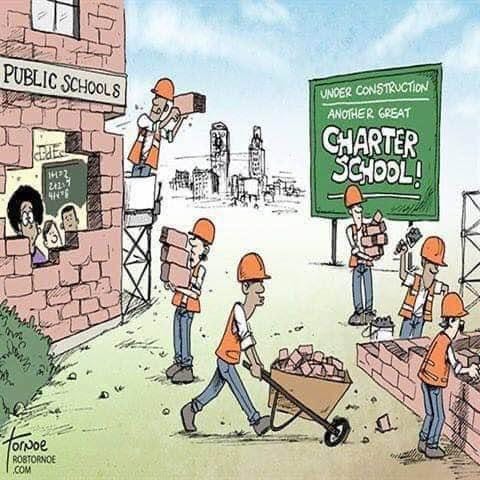Using Public School Funds for Private Education
A troubling trend threatening the U.S. public school systems
Issue #425 Education Wednesday, November 29, 2023
As many of you know, I was educated in the public school system from kindergarten through my Master's Degree, and I also worked as an educator in the public school system for decades.
Although many of my friends went to Catholic schools or other private or religious schools, the majority of the people I knew went to public schools, and there were no educational institutions known as “charter schools.”
Since the middle of the 19th century, public school systems have been funded by local property taxes on homes and businesses. If families chose to send their children to another school that charged tuition, they paid for that schooling in addition to the taxes for their local public school system.
However, in recent years, a concerning trend has emerged in some states - the use of public school funds for private schools, varying in prevalence across different states. The purported underlying reasons for this trend are rooted in the belief that the privatization of education can lead to better academic outcomes and increased school choice for students and parents.
One state where this trend is most prominent is Arizona. According to a report by the Center on Budget and Policy Priorities, Arizona has diverted billions of taxpayer dollars to private schools through voucher programs and tax credits.
Another state that has seen a significant diversion of public school funds is Florida, where the state legislature has supported various initiatives, such as the Florida Tax Credit Scholarship Program, promoting the use of public funds to subsidize private school tuition.
About twelve Republican-led states, including those mentioned above and Texas and Tennessee, are offering some type of voucher or “scholarship” program that would directly divert public funds to parents to pay for charter or religious schools, often under the guise of “parental choice.”
Proponents of using public school funds for private schools argue that it allows students to have access to a wider range of educational options, empowering parents to choose the best fit for their children's needs. Additionally, proponents assert that private schools can provide a higher quality of education due to their ability to be more selective in their admissions process and offer specialized programs.
Some proponents also believe that competition between public and private schools will lead to overall improvement in education outcomes. They claim that when public schools face competition from private schools, they will be incentivized to improve their performance and meet the needs of their students more effectively.
While the argument for increased choice and competition may seem appealing, diverting public school funds to private institutions has numerous negative ramifications for the public school system.
First, it exacerbates existing inequalities in education. By redirecting funds away from public schools, students from disadvantaged backgrounds, rural areas, or low-income families are left with fewer resources and opportunities, widening the achievement gap.
Moreover, private schools can select students based on various criteria, such as academic achievement or behavioral history. This selective admissions process can result in private schools enrolling a disproportionately high number of high-performing students, leaving public schools with a higher concentration of students who may require additional support or have more complex educational needs. This can put a strain on public school resources and hinder their ability to provide a quality education for all students.
The diversion of public school funds to private schools undermines the concept of a free and equitable public education system. Public schools are designed to serve all students, regardless of their background or ability. However, when public funds are funneled into private institutions, it creates a two-tiered education system where access to quality education is determined by wealth and privilege.
Most importantly, the accountability and transparency mechanisms that exist in public schools may not apply to private institutions. Public schools are subject to state regulations, standardized testing, and oversight from elected officials, ensuring that taxpayer dollars are being used effectively and efficiently.
In contrast, private schools have more autonomy and may not have the same level of scrutiny or accountability measures in place. This lack of oversight raises concerns about how public funds are being spent and whether they are truly benefiting students and the public as a whole.
The diversion of public school funds to private schools is a significant and concerning trend in some states. While proponents argue that it increases educational options and competition, the negative ramifications on public schools cannot be ignored.
This trend exacerbates inequalities, undermines the concept of a free and equitable education system, and raises concerns about accountability and transparency. Policymakers, educators, and the public must consider the potential consequences of diverting public school funds and work towards ensuring that all students have access to high-quality education within the public school system.
What are your thoughts about this article? Let’s discuss this in the Substack Notes feature!
We depend on you to help us to grow “We Are Speaking!”
Become one of our paid subscribers.
We appreciate every one of our subscribers, but our paid subscribers help financially support our 7-day-a-week publishing schedule. Please upgrade your subscription to a paid level at no more than $5/month.



